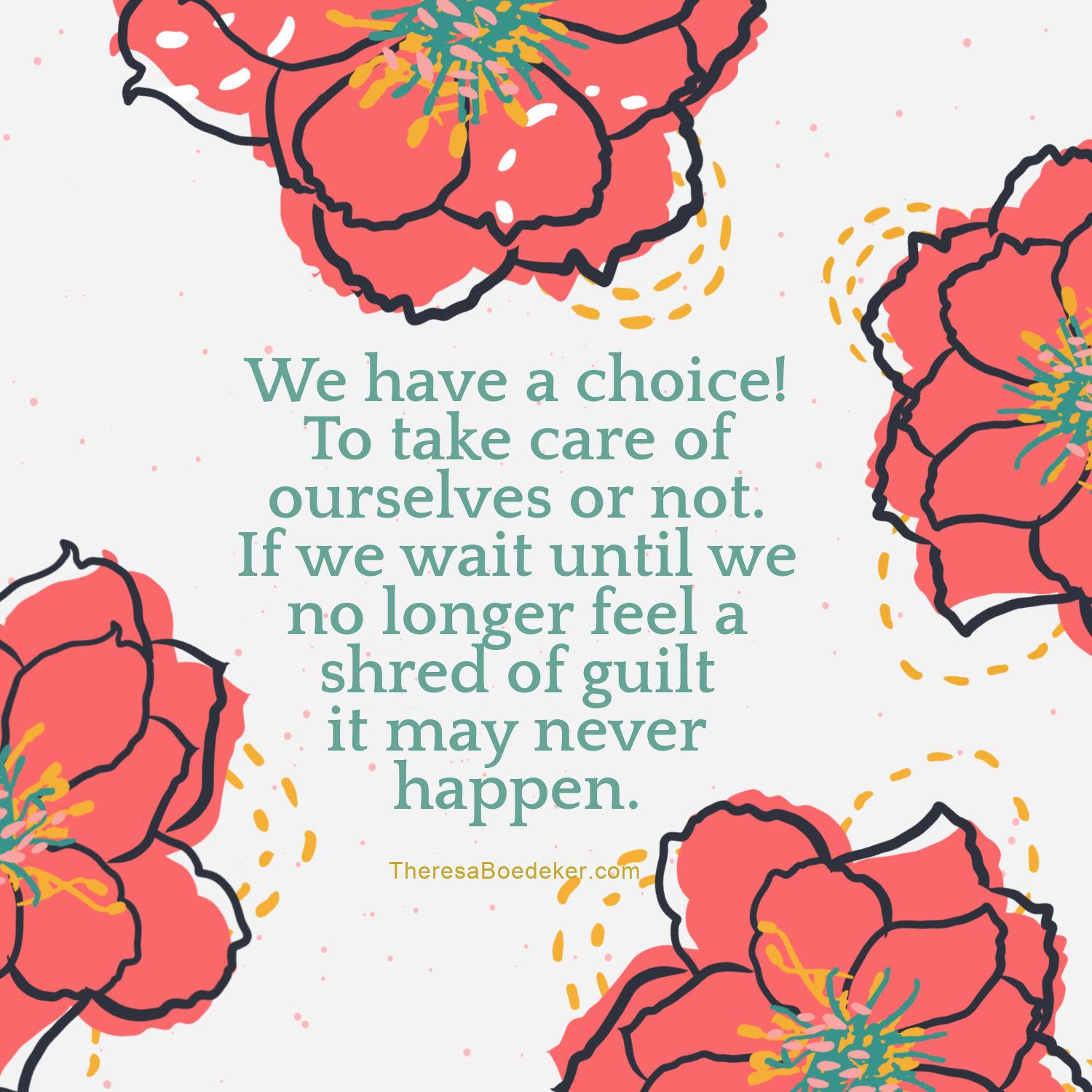As women we are told to take care of ourselves. But when we do, why do we feel guilty?
Crystal, Beth, and I are chatting via Zoom, because isn’t this how we meet and chat now when we have group meetings?
We are supposed to be talking about our writing, but we usually wander into other areas.
Crystal says that she hasn’t written much because she’s been focusing on herself and trying to get healthy. She’s been seeing a therapist, taking naps, eating healthier. All things that fall under self-care.
She isn’t doing anything radical. These are things we see touted in articles and written about in blogs. It is hard to pick up a women’s magazine and not see an article directed to self-care. To being healthy. To taking care of yourself, mentally, physically, spiritually, emotionally, and professionally.
As women, we are told over and over we need to take care of ourselves, so we can take care of others. And yet I don’t see the same relentless push in men’s magazines and on their online sources.
I never have to tell my husband to take a nap if he is tired. Or to eat if he is hungry. Or to make sure he takes time for himself.
I may need to tell him to see a doctor or dentist, but I don’t need to tell him not to run himself ragged helping everyone else, because he listens to his body and doesn’t feel the need to overextend himself.
If he gets tired, he goes to bed and he doesn’t apologize for turning in early. If he takes a day off and doesn’t do much, he doesn’t worry the world will fall apart. If he wants to take a walk in the middle of the day, he doesn’t feel the need to justify it.

As a woman, self-care seems full of guilt.
Clearly my husband doesn’t feel guilty about making healthy choices for himself. Or shaking up his routine so it better serves him. And for this I am glad.
But I haven’t always been glad.
There were times I was jealous because he quit work early to de-stress, and I felt I could not do the same thing. Even if he was telling me to take a day off and let things slide.
The only person stopping me was literally me. And the many pressures and voices I was trying to please.
Can you relate?
Beth and Crystal could.
Because in the next breath Crystal was apologizing for not getting as much done as she had hoped. And Beth was admitting that she was struggling with setting boundaries and saying no to things so she could rest more and have time to focus on her writing. That she had bought a course and felt guilty for spending money on herself. That she feels guilty for not doing more or being a better mom.
We can tell our friend who is running herself ragged to sit down, have a cup of tea, and put her feet up and have a rest. We can tell our friend to set some boundaries and learn to say no. We can tell our friend that she should and can have an hour to read in the evening. We can tell our friend that she deserves to join a yoga class because it will help her be a better version of herself. But can we tell ourselves these things?
Intellectually we realize we should not put ourselves last.
But still, we struggle to not feel guilt for taking care of ourselves. This is where we struggle. Giving ourselves the same permission as we give our friends. Treating ourselves as good as we treat our friends.


Obstacles holding us back from self-care without guilt.
What holds us women back from taking care of ourselves? From engaging in self-care without feeling guilty.
1. Self-pressure and outside pressure. We put a lot of pressure on ourselves, and we adopt and listen to the pressure of others. Be it our family, church, friends, and society.
We are told we can do it all and have it all. That we are to be strong. Look good all the time. Be happy. Appear perfect. Hold everything together. But we can’t keep up that pace day after day without something being dropped. We try to be the perfect wife, mother, friend, and employee. And frankly, we can’t. We are only human.
Evaluate the pressures you put on yourself. The pressures you have adopted from others and now hold as your own. Write them down in a list. The list may show that you have adopted unhealthy pressures. That you are trying to please humans more than your creator. Decide to be motivated out of love, not fear, and get rid of the ones that are harming you.
Remember: we are only human and all we can do is our best. We will make mistakes, need days off, have a learning curve with new things, and our energy is not limitless.
When we quit letting unhealthy pressure from outside sources tell us what to do and how we must act, then we can be healthier humans. We can start listening to our bodies and emotions, and in kindness take care of them and provide them what they need. Instead of ignoring them and pushing them to keep performing at unrealistic standards.

2. False beliefs and unhealthy rules. Often, we have unrealistic rules and beliefs for ourselves. Ones that are different than the ones we have for our friends and kids.
Some lies and falsehoods we believe about self-care:
- You can’t engage in self-care and be a good mom.
- You must meet the needs of others before you start meeting the needs of yourself.
- Self-care is selfish, silly, and a waste of time.
- You don’t deserve to take care yourself until you have . . . .
- God will provide for all your needs.
- We are here to meet the needs of others, not our own.
- A mother’s work is never done; she can meet her needs when the children leave.
- A mom’s needs come last, the husband’s and children’s come first.
- You are responsible for other people’s happiness.
- Things will fall apart if we rest or slow down.
- You need to keep volunteering and helping even when our schedule is full.
- You need to remain cheerful and happy. No being truthful about our emotions.
- You should have no needs. Needing something is selfish and inconvenient.
I hope as you read through these you see the absurdity of these false beliefs that we often use as rules.
A car needs regular maintenance, oil changes and tires rotated, and we don’t think the car is being selfish. Or think it needs to wait until we are not busy. Or that caring for it is silly. And the car is not even alive. If a car has needs and no one bats an eyelash that it needs to be regularly cared for, how much more do you have needs that needs to be cared for?
Many times, we unconsciously keep these rules and hold onto these false beliefs. Not even realizing that we are letting them govern our life. Notice when you are judgmental regarding others. Sometimes it is because they are breaking a rule, you hold ourselves to.
When you feel yourself being judgmental towards others, feel guilt, or get angry at yourself, see if it is because you are breaking an unspoken rule you have for yourself. Or if you are failing to live up to a false belief you have about what you should do, say, or act (perform).
Then make a healthier, and kinder guidelines to replace the unhealthy ones. Instead of thinking you can’t rest until you have finished the task, decide to rest ten minutes or so of every hour; and allow yourself to finish the task at a different time when you feel yourself getting tired. Remind yourself that stopping before you are finished is healthier and kinder then pushing yourself to exhaustion.

3. Unrealistic expectations. Expectations occur when we think if we do A. then B. will happen. For example, if we are a good mother, our children will behave. If we plan ahead, we won’t encounter problems (because we have eliminated all the contingencies).
Thinking that if we engage in self-care and feel guilt, then we are doing something wrong, is an unrealistic expectation. Thinking we can take care of ourselves and not feal guilt is also an unhealthy expectation. Even knowing the reasons for self-care, does not mean we will not feel guilt.
Just because we know we are human and have needs. That as God’s children we take care of our precious bodies, minds, and souls he has given us. That taking care of ourselves is a form of worship and gratitude for what God has gifted us with, does not mean we will not feel guilt. That’s an unrealistic expectation.
If it was all intellectual, we would have this beat.
Just because we feel guilt for taking care of ourselves, doesn’t mean that the guilt is healthy or that we should stop. We need to ask if it is false guilt, rising up from a lie we believe, we have not given ourselves permission to take care of ourselves, or some other reason. Just because we feel guilty reading our bibles or taking a shower, does not mean we should shop doing either one. We need to ask ourselves, where is the guilt coming from? Why am I feeling this way? Is the guilt trying to tell me I need to change something? Is this guilt valid?
Most of our battles are in our minds. We need to take our thoughts captive and remind ourselves of God’s truth. We need to be kind and compassionate with ourselves and ask what God would say to me right now. Or what would my best friend tell me. And please, talk to other women about your experiences and guilt. We can preach the truth and God’s word to one another.
We have a choice. To take care of ourselves or not. If we wait until we no longer feel a shred of guilt, it may never happen. And if we wait until someone else steps up and gives us permission to take care of ourselves, or takes care of us themselves, we may be waiting a long time.

We are the adults now. Don’t let guilt stop you.
Do I still feel guilt for taking care of myself? Yes.
I was raised to be a helper to everyone but myself. I was raised to not say no. I was raised to do for others and not have healthy boundaries. I have had to confront my beliefs I unconsciously held and see them for what they are: lies that were not serving me. And replace them with God’s truth.
We lovingly mother our children and others. We make their favorite foods. Wash their clothes. Teach them to get along with others. Tell them to take a nap. Drink plenty of water. Pick up their toys. Go play with friends. Quit whining. Read a book. We listen to their stories, comfort them, and coach them to make good decisions.
Now we need to lovingly mother ourselves. If we don’t set boundaries, say no to another task, delegate our time wisely, make a doctor appointment, or talk to a counselor about our fears, who will? No one will just walk up to us one day and hand us two hours to relax and do what we want to do. We have to be the ones that put time for ourselves on the calendar.
We are the adults now. We tell ourselves to go to bed. To do the things we don’t want to do, like clean the bathroom, hold our tongues when they are itching for a fight, get off our phones, and process our difficult emotions. We are the ones who do fun things like play tag with the kids, dance in the kitchen, play a board game, celebrate our progress, and watch the stars at night.
And as we do these things, we are teaching our children that caring for themselves is important and something they need to do for themselves.
We don’t want them to grow up feeling guilty for taking care of themselves. Or having needs.

Remember that you are loved more than you can imagine,
Theresa
Joint the Discussion: What helps you deal with the guilt?
Looking for more self-care ideas? Anita Ojeda talks about a lot of “self-care hacks” on her website.

May link up at Maree Dee (#Grace & Truth), Anita Ojeda (#inspirememonday), InstaEncouagements ((IE Link-Up), and Jeanne Takenaka (#tellhisstory).

- How Knowing Your Husband Can Impact Him for Good - March 24, 2022
- How to Stop Focusing on What’s Wrong with You - March 9, 2022
- Is God Really Good All the Time? - February 24, 2022
Theresa, I appreciate this wisdom, “Make a healthier, and kinder guidelines to replace the unhealthy ones.” When my children were younger, it was very hard for me to allow myself some self-care time, but I slowly worked it in. First, by sitting on the couch and reading a book while they played or read. Then, I was able to advance to taking a bath, soaking for hours while reading a book. Sometimes we have to train ourselves and training sometimes starts with baby steps, but baby steps are still steps forward. And eventually we find freedom from self-expectations and other’s expectations.
Lisa, love your example here. Often we need to train ourselves, and those in our house. You were training yourself, but also the kids. I used to train my kids to entertain themselves so I could send them to play with a set timer. They were not to disturb me until the timer went off. We can train our kids to do chores, cook one meal a week, and all sorts of things that help us better take care of ourselves. We start small and move forward.
Theresa, this entire post is a perfect illustration why friendships (online and in person) with wise, godly women who are further down life’s path are so helpful and life-giving. Thanks for the encouragement to care for ourselves as an act of stewardship.
Lois, you are so welcome.
This is a great post! I agree, self-care is so important but sometimes we can feel guilty about making it a priority. I think it helps to encourage one another to do this. I have a friend who I think particularly struggles with guilt over this so I try to encourage her to prioritise herself at times, but she also does the same for me. I think accountability like this can help.
Yes Lesley, encouraging one another is so necessary. My sister and I do this with each other. Accountability and encouragement are great cheerleaders. So glad you have a friend who does this for you.
Theresa, Thank you for reminding us of self care today and that we should never feel guilty for this.
Theresa, What a great post! I loved this part, “Now we need to lovingly mother ourselves. If we don’t set boundaries, say no to another task, delegate our time wisely, make a doctor appointment, or talk to a counselor about our fears, who will?”
It is so hard to take good care of ourselves. I envy my husband when he has no guilt about a nap or time to unwind.
Thank you for sharing with Grace & Truth Link-Up. Sharing.
Hi Maree, it does seem men don’t have the same problems with self-care we women have. And it is not just that they don’t feel guilt, but also the kids don’t knock on their door and the house does not fall apart when they retreat. 🙂
I do not ever feel guilty about taking care of myself. My priorities in this order are my relationship with Jesus Christ, my health, then relationships, and everything else after. Like your husband, I listen to my body closely and I do what it says; rest, stay home, decline that invite, etc. Just the other day I got dressed and headed out. I was back inside within ten minutes because my time could have been better served. Taking care of ourselves is a choice. Either we will or we won’t. It’s up to us! I hope you follow your husband’s lead and make yourself a priority. 🥰
Thanks, Yvonne. And yay for you taking such good care of yourself. We want to teach each other to do this and our children to do this. I do listen to my husband, and he has taught me a lot. We can learn so much from listening to our bodies.
I wonder if part of our guilt over self-care comes from associating it with luxury (spa days, massages, etc. — though those may be legitimate self-care for some) rather than just much-needed time for a nap or half an hour with a good book. The older I get, the shorter my list of things that *have* to get done. I love the illustration about how we give even a non-living thing like a car the care it needs to run well.
That’s a good point, Barbara, about associating self-care with luxury. I do know that I used to concider other things more important than self-care, and so it came last. Yes to less things “having” to get done, and it is so freeing. Naps and reading two of my favorite things to do.
Yes, yes, and YES! Self-care is vital to our wholeness. I think the devil loves to see us deny ourselves basic self-care–it weakens our defenses and makes us easy prey.
So true, Anita. Lack of self-care does make us easy prey.
Theresa, what a great post! What resonated most with me was the unequal standards I use. I give so much more grace to friends and family than I do to myself. The analogy of taking care of the car because it needs to be taken care of is a great analogy. We aren’t meant to go mach seven, nonstop forever and ever amen. God created us to need rest and to need care. I needed this reminder. Thank you!
Thanks Jeanne. We are not made to go nonstop and forever. So often we do have different standards for ourselves and our friends. We need to start treating ourselves with kindness and quit making excuses for why we don’t need to take care of ourselves. When God’s love is pouring through us, it is easier to give ourselves care, because we know he cares for us.
I guess it is where you find it. Barb and I opened our home to the dogs dumped by loathesome individuals on our land, and, now, dying of pancreatic cancer, my main job is to ease her burden when I’m gone, training them all to get along.
Self-care is irrelevant. Duty is all.
Self-care’s not important now,
not here, at end of life.
All that matters is just how
I take care of my wife,
training dogs to tolerate
each other, get along,
for that job will be too late
when I’m dead and gone.
I rise now from the cancer-bed,
puke blood upon the floor,
and though each step is full of dread
I’m heading for the door
to offer all that I can give
for duty while I still may live.
Andrew, we do have a duty to our loved ones and animals and taking care of them and taking care of ourselves. We want to leave the world better than we found it, teach and show love, and take care of each other. Our sense of duty is sometimes the main motivator to get us up and do what we should do when we don’t feel like it. Duty is sometimes the mother voice ordering us to do the hard things. Thanks for taking care of these abandoned dogs.